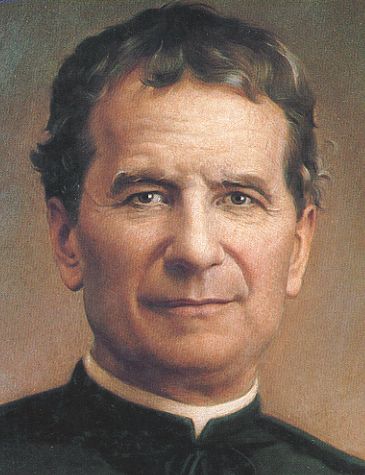
St. John Bosco: the fire of God
Monday, June 8, 2015
*Rogelio Zelada

St. John Bosco
The old pontiff cannot prevent a smile from blossoming on his face. The large canvas has just been unveiled from atop the "Gloria" of Bernini, revealing to the Church and the world the good friend he has just enrolled in the sacred catalog of saints. Pius XI remembers the cool autumn afternoon as if it had just happened, when Don Bosco welcomed him as a very young priest to his house at Valdocco.
The image that frames the stunning window with golden hues captures the soft expression of the holy founder of the Salesians, the initiator of a new educational method, one that cares for students instead of punishing or battering them, at a time and in a society that believed otherwise.
The pope, who had beatified him in 1929, now elevated to sainthood the man who "throughout his lifetime had made the supernatural seem almost natural, and the extraordinary seem ordinary.”
John Melchior Bosco was born in the hamlet of Becchi, in the Piedmont province of Turin, Aug. 16, 1815, the son of Francis and Margaret Bosco Occhiena. His father died when John was not yet two years old. His mother, an illiterate peasant with a strong and extraordinary confidence in God, had to raise not only their two children — ages two and four — but also a stepson from her husband’s previous marriage, while caring for her elderly and paralyzed mother-in-law.
John Bosco was a strong, intelligent and lively child with a prodigious memory. At the end of a Lenten mission, preached in a nearby town, John encountered an old priest who knew him:
"What have you understood from this sermon, so full of quotations in Latin?"
"In truth, I think I understood what the missionary wanted to say," replied the boy, who was 14 years old at the time.
"Really? What if you tell me three or four things from the sermon, and I give you these coins in return?"
Calmly, but with great confidence, John Bosco recited the whole sermon to the old priest, as if he were reading it. At that moment, the boy gained a wise teacher who helped him in his studies, in developing his prayer life and in the sacramental practice.
In order to be able to study, John worked as a laborer in the field. He was also a carpenter, waiter, blacksmith, baker, shoemaker, apprentice tailor and sacristan. He became an acrobat, magician, puppeteer, and learned to play the piano and the violin to attract children and tell them about God's love. With hard work and overcoming many difficulties, he entered the seminary in Turin, thanks to the advice and spiritual direction of a young priest, St. Joseph Cafasso, who also introduced him to prison ministry and visiting hospitals.
Then he encountered the harsh reality of the great hordes of children who were all around, fleeing poverty, orphaned or abandoned, despised and rejected by society.
One day, as he was preparing to celebrate Mass in the Church of St. Francis, he saw the sacristan slap a young man because of his awkwardness in helping him set things up for the Mass.
Don Bosco intervened quickly:"I will not allow a friend to be mistreated."
"A friend of yours, this animal?"
"Whoever receives abuse, becomes my friend."
This young man not only received the loving kindness of the good priest, but brought along others like him, so many that Don Bosco had to organize "youth clubs" and find a place to accommodate the growing multitude of young people — ragged, poor, lazy, negligent, dirty, ex-convicts, hungry, full of misery and abandoned — for whom Don Bosco became their best friend and teacher. He had to organize them, support them in their work, give them training and education, develop in them the ability to engage in trades or the arts so they could earn a living as God intended.
Don Bosco's mother came to Turin to be the mother and grandmother for those boys who by now numbered almost 500, sharing with them the poverty and also the joy of the work of her son, John.
To support his educational work, Don Bosco and a group of peers decided to organize a new religious congregation. He got the rules approved by Pope Pius IX, but Rome’s approval took 15 years to arrive. The first 39 Salesians who began working in 1863 had grown to 786 when Don Bosco died, and today there are thousands in an educational association for youth that spans the globe.
The Daughters of Mary Help of Christians, founded with St. Mary Mazzarello, also spread the style and charisma of the saint of Turin throughout the world.
St. John Bosco forever shaped a new way of education based on respect and a sense of responsibility. No one ever trusted, like him, in the ability of young people to respond when they feel appreciated and valued. A few years before his death, he wrote: "I do not remember having ever used punishment. By the grace of God, I could always get children not only to follow the rules, but also to not want to make me even a little upset."
The year 2015 marks the bicentennial of the birth of this colossal educator, the great saint of joy, poverty, trust, transparency and perseverance. An extraordinary worker for the Divine, for whom nothing was impossible because he possessed the fire of God; someone who attracted crowds and amazed the skeptics of his time.
He left a great legacy of "work and piety," and the firm belief that the only important thing, both then and now, was "to seek out souls, always souls and only souls, in order to lift them up to the Lord."

